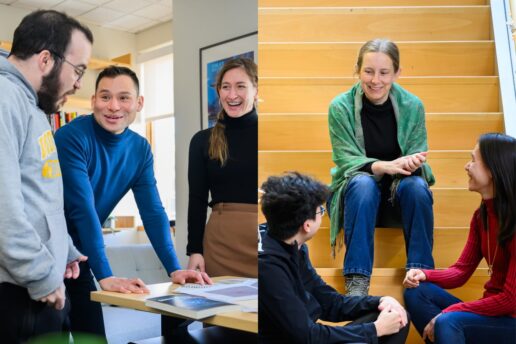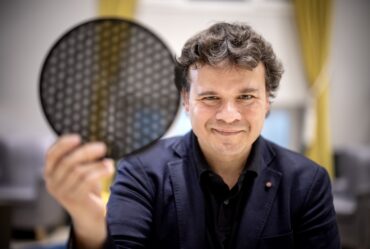
Paying it forward
Professors Erik Lin-Greenberg and Tracy Slatyer are honored as “Committed to Caring.”
MIT professors Erik Lin-Greenberg and Tracy Slatyer truly understand the positive impact that advisors have in the life of a graduate student. Two of the most recent faculty members to be named “Committed to Caring,” they attribute their excellence in advising to the challenging experiences and life-changing mentorship they received during their own graduate school journeys.
Tracy Slatyer: Seeing the PhD as a journey
Tracy Slatyer is a professor in the Department of Physics who works on particle physics, cosmology, and astrophysics. Focused on unraveling the mysteries of dark matter, Slatyer investigates potential new physics through the analysis of astrophysical and cosmological data, exploring scenarios involving novel forces and theoretical predictions for photon signals.
One of Slatyer’s key approaches is to prioritize students’ educational journeys over academic accomplishments alone, also acknowledging the prevalence of imposter syndrome.
Having struggled in graduate coursework themselves, Slatyer shares their personal past challenges and encourages students to see the big picture: “I try to remind [students] that the PhD is a marathon, not a sprint, and that once you have your PhD, nobody will care if it took you one year or three to get through all the qualifying exams and required classes.” Many students also expressed gratitude for how Slatyer offered opportunities to connect outside of work, including invitations to tea-time.
One of Slatyer’s key beliefs is the need for community amongst students, postdocs, and professors. Slatyer encourages students to meet with professors outside of their primary field of interest and helps advisees explore far-ranging topics. They note the importance of connecting with individuals at different career stages, often inviting students to conferences at other institutions, and hosting visiting scientists.
Advisees noted Slatyer’s realistic portrayal of expectations within the field and open discussion of work-life balance. They maintain a document with clear advising guidelines, such as placing new students on projects with experienced researchers. Slatyer also schedules weekly meetings to discuss non-research topics, including career goals and upcoming talks.
In addition, Slatyer does not shy away from the fact that their field is competitive and demanding. They are honest about their experiences in academia, noting that networking may be just as important as academic performance for a successful career.
Erik Lin-Greenberg: Empathy and enduring support
Erik Lin-Greenberg is an assistant professor in the history and culture of science and technology in the Department of Political Science. His research examines how emerging military technology affects conflict dynamics and the use of force.
Lin-Greenberg’s thoughtful supervision of his students underlies his commitment to cultivating the next generation of researchers. Students are grateful for his knack for identifying weak arguments, as well as his guidance through challenging publication processes: “For my dissertation, Erik has mastered the difficult art of giving feedback in a way that does not discourage.”
Lin-Greenberg’s personalized approach is further evidence of his exceptional teaching. In the classroom, students praise his thorough preparation, ability to facilitate rich discussions, and flexibility during high-pressure periods. In addition, his unique ability to break down complex material makes topics accessible to the diverse array of backgrounds in the classroom.
His mentorship extends far beyond academics, encompassing a genuine concern for the well-being of his students through providing personal check-ins and unwavering support.
Much of this empathy comes from Erik’s own tumultuous beginnings in graduate school at Columbia University, where he struggled to keep up with coursework and seriously considered leaving the program. He points to the care and dedication of mentors, and advisor Tonya Putnam in particular, as having an enormous impact.
“She consistently reassured me that I was doing interesting work, gave amazing feedback on my research, and was always open and transparent,” he recounts. “When I’m advising today, I constantly try to live up to Tonya’s example.”
In his own group, Erik chooses creative approaches to mentorship, including taking mentees out for refreshments to navigate difficult dissertation discussions. In his students’ moments of despair, he boosts their mood with photos of his cat, Major General Lansdale.
Ultimately, one nominator credited his ability to continue his PhD to Lin-Greenberg’s uplifting spirit and endless encouragement: “I cannot imagine anyone more deserving of recognition than Erik Lin-Greenberg.”


